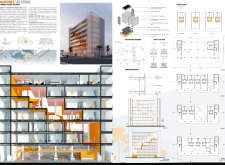Buildner is a global leader in organizing architecture competitions of all scales — from furniture, cottages, and guesthouses to full city rebranding. With prize budgets ranging from €5,000 to €500,000, Buildner brings proven global experience to every competition.
Launch a competitionLaunch a competition
Introduction
Buildner is pleased to present the results to the Las Vegas Affordable Housing Challenge!
This competition is part of Buildner’s Affordable Housing series, in partnership with ARCHHIVE BOOKS, showcasing projects that invent new means for driving down housing prices. Designers were tasked with proposing a flexible, innovative, pilot-phase concept for affordable housing within Greater Las Vegas.
Buildner’s Affordable Housing design series posits that there is no one right answer to making housing affordable. Today, a host of new ideas and platforms are enabling people to own or purchase homes. These creative methods include everything from community co-living facilities, to 3D-printed homes, stackable modular homes, new zoning policies and new forms of transit-oriented development.
In 2017, Las Vegas was revealed to be the least affordable city in the USA for renters, with the biggest shortage of affordable and available rental homes according to figures from the National Low Income Housing Coalition. It was found that Las Vegas only had 12 affordable rental units available for every 100 households classified as “extremely low income.” This situation is untenable.
This competition tasked participants with proposing design-related solutions to the city’s housing crisis. They were encouraged to submit flexible solutions to accommodate a range of unit sizes including families, single professionals, and couples. There was no set competition site or scale, and participants were encouraged to be as creative as possible. The jury sought projects that challenge typical ideas of housing, design, and the community at large, while at the same time maintaining a practical element that could potentially see these designs realized.
Buildner collaborated with a regional and international interdisciplinary jury panel: Craig Galati is a Principal of Las Vegas*based architecture firm LGA and has received honors including the AIA “Nevada Service Award,” and the American Planning Association “DeBoer Excellence in Planning Award” for his outstanding service on the City of Las Vegas Planning Commission; Avi Friedman is a professor of architecture at McGill University Peter Guo-hua Fu School of Architecture and president of Avi Friedman Consultants, a design firm with a focus on affordable and sustainable residential environments; Persis Lam is an associate at Toronto-based Diamond Schmitt Architects as well as executive member of Building Equality in Architecture Toronto (BEAT); Dr. Steffen Lehmann is a tenured full Professor of Architecture and former Executive Director of schools of architecture, including the UNLV School of Architecture in Las Vegas; Christina Lennox is the Cofounder and Chief Product Officer of Brownstone, a shared housing company which makes sleeping pods that transform existing homes into affordable shared living arrangements; Maya Mahgoub-Desai is the Chair of Environmental Design at OCAD University and a practicing Urban Designer and Planner with Moriyama Teshima Architects whose research focuses on public health; Fotini Pitoglou is a licensed architect in Ontario, Canada, the UK and Greece and a lead architect on hospitality projects at Toronto-based FORREC as well as an executive member of Building Equality in Architecture Toronto; Caitlin J. Saladino serves as the Director of Strategic Development at The Lincy Institute and Brookings Mountain West, a public policy think tank focused on improving health, education, economic development, governance, non-profits, and social services in Nevada; and Andreas Tjeldflaat, who is the founder of Framlab, a New York and Bergen-based design studio.
Buildner and its jury panel thank all individuals and teams that submitted proposals.
We sincerely thank our jury panel
for their time and expertise
Dr. Caitlin J. Saladino
Director of Strategic Development at The Lincy Institute and Brookings Mountain West
USA

Christina Lennox
Cofounder and Chief Product Officer of Brownstone
USA

Dr. Steffen Lehmann
UNLV School of Architecture
USA

Avi Friedman
Professor at McGill University
USA

Craig Galati
Principal and Shareholder of architecture firm LGA
USA

Maya Mahgoub-Desai
Chair of Environmental Design, OCAD University
Canada

Persis Lam
Associate Architect, Diamond Schmitt Architects
Canada

Fotini Pitoglou
Architect, FORREC
Canada

Andreas Tjeldflaat
Founder, Framlab
Norway

1st Prize Winner
(still) LEARNING FROM LAS VEGAS


Architecture competitions of this nature allow anyone to challenge and provide a fresh approach to existing design dogmas. It is an incredible chance to step away from the conventional means of execution and present a different perspective to a broader audience. It helps to facilitate change in the profession through exposure and discussion, as well as one’s own professional growth. Competitions are a great venue for experimentation, and a laboratory to unpack and test design philosophies.
Read full interview United States
United States
Jury feedback summary
(still) Learning From Las Vegas seeks to counteract current urban models in which large distribution infrastructure utilizes prime real estate within the city’s urban center. It does so by building upon the existing warehouses that proliferate around Las Vegas.
Buildner's commentary, recommendations and techniques review
Order your review here
The single-sheet presentation communicates a clear story that is dually urban and human in scale as told through its renderings and drawings. The hierarchy and color balance are both strong, using colorful renderings that lead the eye from high-level primary imagery to supporting detailed images. The text, while adequate perhaps for a portfolio to describe the full story to a reader unaware of the project background or purpose, is too lengthy for a single-sheet submission.
2nd Prize Winner
Common Ground

 China
China
Jury feedback summary
Common Ground proposes a scheme to transform underused urban spaces within downtown Las Vegas such as parking lots, deserted cinemas and casinos. The ground floor is ‘lifted’ to generate a public layer of community, cultural and commercial spaces supporting the residential program above.
Buildner's commentary, recommendations and techniques review
Order your review here
The project is commendable for its thorough communication of a complex problem, its analysis and its proposed solution. The clear and simple title is catchy, sophisticated and representative of the project concept. The presentation suffers from a lack of hierarchy which is lost in part due to the shear density of drawings and text.
3rd Prize Winner
Affordable Life


Competition is the moment to be involved in different themes and scale, sometimes to do pure research with less constraints of real world, sometimes to confront with projects about your professional interests to indagate new solutions.
Read full interview Italy
Italy
Jury feedback summary
Affordable Life is a proposal for the construction of autonomous residential units capable of being installed atop waste areas in the city. Like a campsite, the proposal is for a partly self-sufficient and reversible system which only partially or punctually relies on the city’s services. The modular nature of the design promises flexibility and adaptability over time for the city and its inhabitants.
Buildner's commentary, recommendations and techniques review
Order your review here
The submission layout is excellent. The use of a single larger rendering to describe the urban quality of the project immediately draws a reader into the page and visually explains the key concepts. This is supplemented by three human-scale perspectives which are smaller in size but equally descriptive of the project.
Buildner Student Award
LOA - Land of all


Personally, I see architecture competitions as an intellectual delight and a way to acknowledge and measure the current practices on an international basis. Also, it is a way to improve my skills of design and graphic representation and keep them at the sharpest level.
Read full interviewJury feedback summary
LOA aims to address housing issues by focusing on three interrelated aspects of Las Vegas : the tourism economy, the city in plan, and sustainable building practices. The project proposes a modular heavy timber structure and prefabricated insert homes with an envelope of rammed earth panels.
Buildner's commentary, recommendations and techniques review
Order your review here
As with other successful projects, this submission makes use of a primary rendered image well-located at the center of the sheet. The presentation has a clear urban plan and analysis followed by axonometric views to describe how the project may be convincingly inserted within the city. The overall use of color is consistent and sophisticated.
Buildner Sustainability Award
The Urban Drawer Cabinet Project - Affordable Housing in Las Vegas


I'm taking part in architecture competitions because I enjoy developing new ideas and turning them into designs.
Read full interview Germany
Germany
Jury feedback summary
The Urban Drawer Cabinet Project is a proposal for a kit of parts consisting of a structural ‘carrier’ that can be built within and over existing railway infrastructure within Las Vegas. Individual ‘cabinet’ living units consisting of a structural steel frame system and prefabricated timber elements of various sizes can be inserted into the carrier. The system is designed to a standard 3x3m module for consistent connectivity to vertical circulation.
Buildner's commentary, recommendations and techniques review
Order your review here
The submission takes advantage of a single large urban rendering to describe the project’s design intent and to provide a reader with a single primary image to digest. The image utilizes bold colors that are also varied to provide balance and to avoid visual monotony.
Honorable mentions
Shortlisted projects























































































